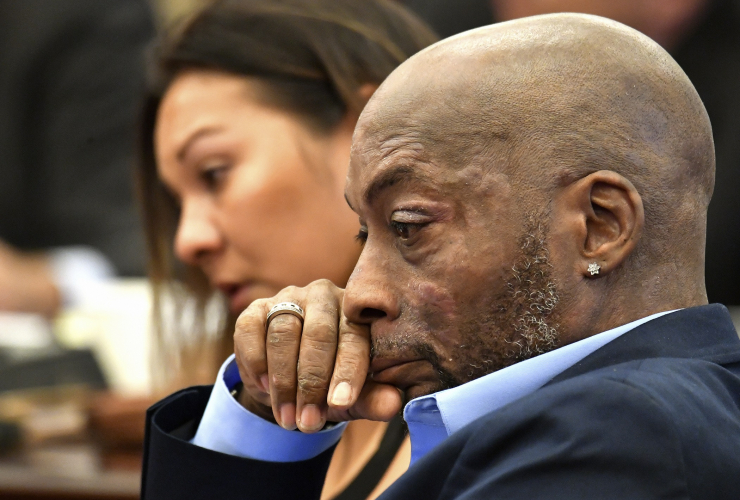Why was Rod Cumberland, New Brunswick’s most prominent critic of the herbicide glyphosate, fired from his job as a college wildlife instructor?
This very question is being posed by Cumberland’s supporters and former students since he was dismissed — without warning — on June 20 from his teaching post at the Maritime College of Forest Technology (MCFT) in Fredericton, N.B. MCFT trains students for the forest industry.
“Our college is run by a board of governors and the members consist of (the forest) industry and (provincial Department of Energy and Resource Development) and the feds. It’s no secret that several of them have been critical of my position on glyphosate,” said Cumberland in an interview with National Observer.
In a statement, MCFT denies Cumberland was terminated due to his position on glyphosate.
Glyphosate is the world’s most widely used herbicide and is sprayed heavily in New Brunswick to encourage the growth of softwood trees, which are coveted by the pulp and paper industry. But glyphosate is also linked to destroying wildlife and, increasingly, to cancer. For years, Cumberland has been a well-educated critic of glyphosate’s use in the province.
One person who believes that Cumberland was dismissed because of his stance on glyphosates is Gerald Redmond, MCFT’s former executive director.
“There is no other explanation,” he says. Redmond was involved in hiring Cumberland as an instructor back in 2012 and says he might be “one of the best instructors, teachers, mentors that we have had (at the college) in decades.” Redmond retired from this role in 2017, but continued on as a part-time contract instructor.
“Before I left, I told him to watch his back because I knew there were people on the board who didn’t like (his position on glyphosate) and of course they were closely tied to industry,” Redmond says. “While I was there I was able to deflect (the pressure)… I had pressure from individuals on the board to sanction Rod. Sometimes it was subtle pressure and sometimes it was a little more direct.”

Redmond started a Facebook page in support of Cumberland and did an interview with the CBC about the dismissal. On July 4, Redmond’s position at MCFT as a part-time contract instructor was terminated by the college, which gave no specific reasons.
Now two of New Brunswick’s smaller opposition parties, the Green party and People’s Alliance, have condemned the two firings and demanded an inquiry. The Canadian Association of University Teachers (CAUT), which represents 77,000 academics across Canada, also condemned MCFT, saying in a letter to the college's executive director, Tim Marshall: “The dismissals of Mr. Cumberland and Mr. Redmond strongly suggest that the MCFT has violated their academic freedom and their basic right to due process.”
If Cumberland was fired because of his views on glyphosate, the move is not unprecedented in New Brunswick: In 2015, then-premier Brian Gallant’s Liberal government terminated Dr. Eilish Cleary, the province’s chief medical officer, who was at the time working on a study examining the health impacts of the herbicide. Cumberland says numerous other government officials who’ve opposed current forest practices have been removed from their posts.
Cumberland is a longtime critic of herbicide glyphosate — angering forest industry
Cumberland, 54, a father of four, has worked for three decades in the area of wildlife study and education. For 15 years he was New Brunswick’s chief deer biologist. It was in that capacity he linked glyphosate with the collapsing of the deer population, which fell from 286,000 in the 1980s to 70,000 by 2014.
But Cumberland found that the Department of Natural Resources, where he worked at the time, was uninterested in his findings. The department oversees Crown land, which in turn is leased out to forest companies, the largest of which is J.D. Irving Ltd., the Saint John, N.B.-based forest, shipbuilding, retail, media and transportation conglomerate owned by one of Canada’s richest billionaires, James (JK) Irving. J.D. Irving’s media company, Brunswick News Inc., hit the international news last month for terminating the contract of freelance cartoonist Michael de Adder, who had posted a cartoon about Donald Trump that went viral.
In 2012, Cumberland left government to take a post as instructor at MCFT. Soon afterwards, he went public with his concerns about glyphosate, often joining forces with environmental groups.
“The Rod Cumberland I know is a genuine father, scientist, researcher and educator,” says Lois Corbett, executive director of the Conservation Council of New Brunswick. Corbett explains that Cumberland opposed industry practices such as the clear-cutting of forests and planting of monocultures that impact biodiversity.

Cumberland helped galvanize the growing opposition to glyphosate spraying in New Brunswick.
Consequently, Cumberland became a primary target of the forest industry and its supporters. Since at least 2014, J.D. Irving and other forest companies, along with provincial and federal government officials, have tried to discredit Cumberland. In 2014, for example, J.D. Irving issued a strongly worded letter from the company’s chief wildlife biologist, John Gilbert, focusing on Cumberland and his research. “The most recent attacks on forest management in New Brunswick by Rod Cumberland are irresponsible and are not supported by current data and scientific research,” Gilbert wrote in a letter posted on the company’s website.
The governments and industry even set up a website to defend the herbicide, and paid scientists who support glyphosate to tour cities and towns across New Brunswick and Nova Scotia and conduct seminars designed to address public concerns.
Redmond says that when he was Cumberland’s superior at MCFT he had no issue with Cumberland’s public campaign against glyphosate. “He was acting professionally,” Redmond says. “As long as he didn’t project himself that his opinions were those of the college, there was no issue on my part.”
But Redmond says certain board members were clearly unhappy.
MCFT board dominated by forest industry — including J.D. Irving
MCFT’s current board is made up of mostly provincial and federal government officials and representatives of forest companies, including J.D. Irving, Acadian Timber, Port Hawkesbury Paper, Eacan Timber and ARAUCO.
Redmond says that soon after he became executive director of MCFT in 2014, he held a meeting with representatives of J.D. Irving to see if the company would donate money to the college. He says an attendee was Jason Limongelli, a vice-president with J.D. Irving.
“I certainly got the impression that they were not happy with Rod and my feeling was if I didn’t do something about Rod I was not going to get any money from Irving,” recalls Redmond. “And if you look at the record, the college has provided literally hundreds of employees for Irving over the years but they’ve never made a significant financial investment in the college. To me that is a little bit telling. It might be circumstantial.”
Last September, Limongelli was appointed to the board of MCFT. When contacted by National Observer, he referred all questions about Cumberland to the chair of the board, Peter Adams (who did not respond to efforts to contact him). When asked about the meeting between Irving officials and Redmond, he said he could not comment but added he didn’t “recall that at all” in regards to Redmond’s belief Irving didn’t want Cumberland at MCFT.
J.D. Irving spokesperson Mary Keith did not directly address National Observer's questions about Redmond’s version of the meeting, but said: "Mr. Limongelli did not do what Mr. Redmond suggests, either indirectly or directly."
Another MCFT board member Cumberland and Redmond believe may have pressed for his dismissal is Tom MacFarlane, deputy minister of New Brunswick’s Deptartment of Energy and Resource Development. Redmond says MacFarlane “has shown his distaste for Rod when I have been at meetings twice a year with the board of governors.”
MacFarlane’s office was contacted but referred queries to MCFT. When Mike Holland, the current minister of the department, was reached by National Observer, he said MacFarlane “has had and continues to have relationships beyond me and I have no addition to add on issues between Mr. MacFarlane and anybody.”
The board also includes a representative from the federal Natural Resources Department (NRCan). The department is one of the partners behind the website, forestinfo.ca, that was set up a few years ago to combat Cumberland's criticisms of glyphosate, and provides three NRCan scientists to conduct seminars across the Maritimes to allay the public's concerns about glyphosate. The website claims glyphosate does not cause cancer or impact deer. A spokeswoman from NRCan told National Observer that its representative on the college’s board never discussed Cumberland’s research on glyphosate with other board members. She also said the department couldn’t comment on internal human resources matters at the college.
There were various reasons given for Cumberland’s dismissal.
His termination letter said he’d prevented students who were late from entering classrooms; intentionally adjusted the clock in his classrooms ahead to give students the Illusion they were late; physically removed hats of students and made them apologize to get them back; made offensive and inappropriate comments in the classroom, and engaged in conversations that could be viewed as harassment and cause embarrassment to MCFT.
One other reason cited was over a seminar in March — held in the same complex that houses MCFT — where pro-glyphosate scientists held a talk. Cumberland went to the seminar. The letter accuses Cumberland of discouraging students from attending.
Cumberland disputes all the reasons in the letter and denies dissuading students from attending the glyphosate seminar.
“I attended it and asked questions and I encouraged students to look at both sides of (the issue),” he says, adding: “They just wanted to get rid of me.”
Calls made to Tim Marshall, the current executive director of MCFT, were not returned. However, the college released a statement in which it said the board supports Marshall, but also claimed Redmond had disclosed confidential MCFT information. When asked about this, Redmond says the only thing he posted was a 2016 list of the MCFT’s board of governors. “This is a public institution,” he points out.
Meanwhile, the Facebook page in support of Cumberland has received numerous messages of support from former students and colleagues. One ex-student, Makayla Dawn Campbell, wrote: “Rod Cumberland taught us how to behave in a common work environment, he made us excited to learn more about what was being said, and to question what we didn't understand. He showed up to every class overflowing with endless enthusiasm, but most importantly, he taught us to show respect to our instructors and fellow students.”
But as Lois Corbett of the Conservation Council says: “I think it’s an indication of a corporate agenda. If your business is about making money out of pulp and paper products, and the widespread use of glyphosate, then Rod is a problem for you. If you’re a corporate guy, you would ask ‘Why don’t we just fire the guy?’”
One can't help but notice the
One can't help but notice the preponderance of recent articles in the National Observer on Big Mining abuse, Big Oil abuse, and now Big Forestry abuse. All just further evidence of the extreme Corporate profit driven agenda controlling the worldwide agenda. A huge wake up call for a much needed and overdue complete overhaul of societal governance and the economic system.
Do they really think that
Do they really think that firing someone will magically make the public unaware of the issue?
Just more evidence that NB is
Just more evidence that NB is a "captured " province by corporate interests.
MY VIEW:
MY VIEW:
Suppression of ideas, of intellectual freedom of expression and suppression of the intellectuals like teachers, professors and scientists is one of the first things that any and all fascist governments do. Right now Zionist Israel is purging intellectuals at their universities as is Trump who is now inviting only the right wing media to the White House for a 'summit' and who has deemed that no government agencies can use the words 'Climate Change' in any government papers. This is a deliberate right wing suppression of freedom of ideas and facts by corporate backed, right wing, fascist governments at all levels from federal to towns.
This is happening world wide now and Canada is NOT immune from these kinds of attempts at suppression from the conservatives in our country. We have only to look back to the deliberate suppression of science and scientific facts and his distancing from the press by Harper during his 'reign'.
We cannot allow these right wing conservatives to come back into power again.
Vote strategically and vote ABC.
Maybe the NB forest industry
Maybe the NB forest industry that seems to be mired in the dark ages of corporate malfeasance and suppression of the "serfs"; should take a lesson from the "progressive" indigenous tribes of BC who are using sheep to control unwanted undergrowth in their plantations? Seems lika a win-win, happy helpful sheep and profits on the hoof from the wonder fibre - wool, that doesn't produce micro plactics in our waters... What more could you ask?






Comments